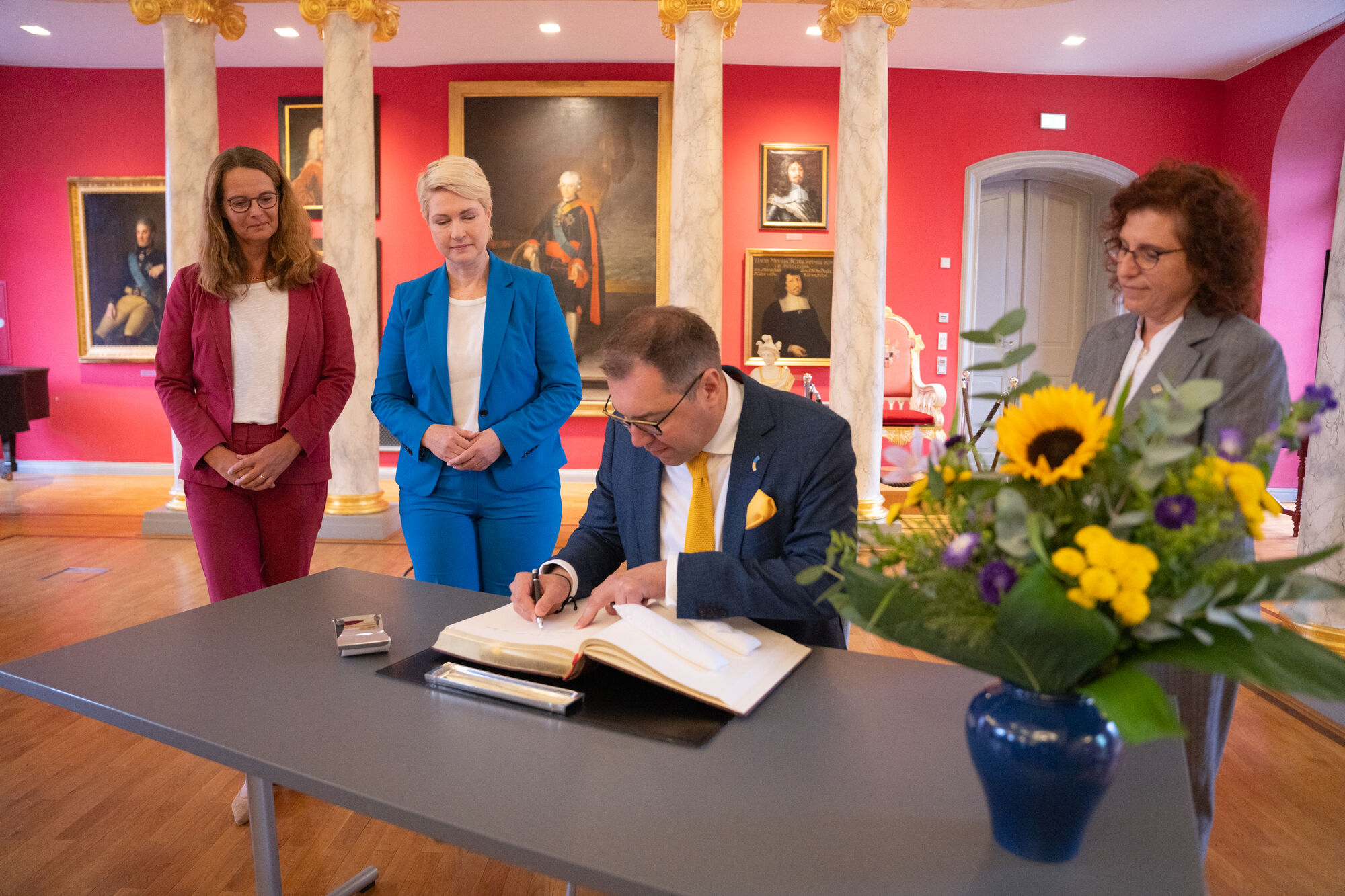The discussion round between the guests and researchers focussed on a central concern of the Ukrainian Ambassador: “How can academia help people in Germany learn more about Ukraine?” was the question Oleksii Makeiev put to the academics. They developed initial ideas, for example, the instigation of further training and continuing professional development courses on Ukrainian history as an option in teacher-training offers, as well as a closer-knit collaboration for establishing a partnership region for Mecklenburg-Vorpommern in Ukraine. Furthermore, they discussed the possibility of holding a Ukraine Day at the University of Greifswald for students and the public with the participation of the Ambassador. The State Government promised its support for increasing the visibility of research and teaching offers on Ukraine.
H.E. Oleksii Makeiev and Minister-President Manuela Schwesig started their visit by signing the university’s guest book in the presence of the Rector, Prof. Dr. Katharina Riedel, Pro-Rector Prof. Dr. Annelie Ramsbrock and the Chairperson of the Senate, Prof. Dr. Uwe Bornscheuer in the historic Aula.
The discussion round with researchers and students of Ukrainian studies at the University of Greifswald was opened by Dr. Roman Dubasevych, Junior Professor of Ukrainian Cultural Studies, who presented details about the activities of the professorship, which is unique to Germany. Greifswald’s Ukrainian studies is an important component of IFZO that is jointly funded by the Federal Government, the State of Mecklenburg-Vorpommern and the university and is dedicated to interdisciplinary and cross-faculty research into cultural, linguistic, historic, political, economic, legal and theological aspects of the Baltic Sea region. In its internationally oriented research projects, IFZO supports research into globally relevant issues, for example joint cultural heritage, social discourse and service and security infrastructures, energy and sustainability issues, as well as the economic development of the Baltic Sea region.
Prof. Dr. Kilian Heck, Chair of History of Art, then reported on the activities of the network Ukraine Art Aid Center - UAAC. Under the umbrella of the German-Ukrainian Society, the UAAC is committed towards protecting the cultural heritage of Ukraine. Financed by the Federal Foreign Office and through donations, more than 600 museums, archives, libraries and cultural venues such as theatres and opera houses in Ukraine have already received support. Prof. Dr. Kilian Heck is a member of the UAAC’s steering group, which consists of five voluntary members.
Further information on Greifswald’s Ukrainian Studies and Baltic Sea region research
The foundation for Greifswald’s Ukrainian Studies was laid on the initiative of the former scholar of Slavonic Studies and translator of Ukrainian literature, Dr. Rolf Göbner. Ukrainian Studies was later established in the 1990s by the linguist Prof Dr. Valerij Mokijenko and the literary scholars Dr. Alexander Kratochvil und Prof. Dr. Alexander Wöll. Dr. Roman Dubasevych has been Junior Professor of Ukrainian Cultural Studies since 2015.
One of the USPs of Ukraine research in Greifswald is the international summer school “Greifswalder Ukrainicum”, which has now been held for 27 years and is hosted in collaboration with the Alfried Krupp Wissenschaftskolleg Greifswald (Institute for Advanced Studies). The summer school is aimed at students and researchers as well as representatives from politics, the commercial sector, diplomacy and the civil society. It is dedicated to imparting knowledge of the Ukrainian language, culture, politics and history, as well as social discourses.
The BMBF Collaborative Project “(Un)dicsciplined: Pluralizing Ukrainian Studies—Understanding the War in Ukraine” (UNDIPUS), based at the Chair of Ukrainian Cultural Studies and run in collaboration with two further universities, looks into current topics of research on Ukraine.
Further information
Chair of Ukrainian Cultural Studies [de]
Interdisciplinary Centre for Baltic Sea Region Research (IFZO)
Summer school Ukrainicum 2023
Ukraine Art Aid Center [de]
The photo is available on request from pressestelleuni-greifswaldde and can be used for free for editorial purposes in combination with this media release. If published, the author of the image must be named.
Contact at the University of Greifswald
University Communications
Domstraße 11, Entrance 1, 17489 Greifswald
Tel: +49 3834 420 1150
pressestelleuni-greifswaldde

